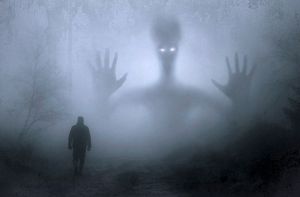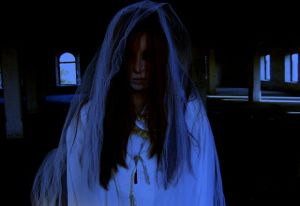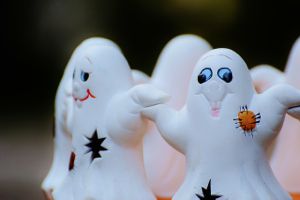Do you sometimes feel, when you’re putting words on paper,
that there’s someone else in the room?
Well it’s Halloween season, so that may have something to do with it, but then again, writers are notorious for feeling sort of…well, haunted.
Sir Arthur Conan Doyle, who wrote the Sherlock Holmes books, was said to have attended séances, and to have claimed he had several encounters with spirits. In one incident, he claims he woke up “with the clear consciousness that there was someone in the room, and that the presence was not of this world.”
Song writer Sting also claims to have seen a ghost in his 16th century English manor house—a woman and her baby. ”I was in bed one night, a very old house I used to live in,” he said in a radio interview. “And I woke up at three in the morning, bolt upright, looked into the corner of the room and thought I saw Trudie standing there with a child—our child—in her arms, staring at me. And I thought ‘well, that’s strange—why is she standing in a corner, staring at me?’. And I then reached next to me and there was Trudie, and I suddenly got this terrible chill.”
The Washington Square Hotel says that three writers have haunted Greenwich Village, including Dylan Thomas, Edgar Allen Poe, and Mark Twain. Twain lived at 14th West 10th Street for about a year, and his ghost is said to make appearances near the residence: “He’s usually seen in a white suit, and on the first floor or by the staircase inquiring about some business he must tend to.”
The stories of ghosts and writers are as varied as the writers themselves, but no matter whether you believe in the supernatural or not, you may struggle with your own ghosts on occasion. Below are five of the most likely to haunt writers. Do any of these sound familiar?
5 Ghosts that Frequently Haunt Writers
 1. The Ghost of a Relative or Former Teacher (Insulting Ghost)
1. The Ghost of a Relative or Former Teacher (Insulting Ghost)
This ghost shows up just when you think things are going well with your writing. It’s crap, the ghost whispers, and you recognize its voice. It’s the teacher who criticized your writing in school, or the relative who told you to “get serious” and do something worthwhile with your time. The person may still be alive, and yet its ghost persists in the writing nook. You’re wasting your time. Go do something useful.
Ghost-Busting Technique: Time to let this ghost know it can no longer hang out in your writing nook. Try “smudging,” which is the practice of burning sacred herbs to get rid of negative energy. Sage is the most common herb used, though Sweetgrass and cedar are also popular options. Crush the herbs in a bowl and burn them, or try pre-made “smudge sticks.”
 2. The Foggy Ecto-Mist (Blocking Ghost)
2. The Foggy Ecto-Mist (Blocking Ghost)
This is the misty, swirling fog that arises in a writer’s brain, what paranormal investigators call the “ecto-mist” or “ghostly mist.” Also described as a “cloud,” it obscures creative thought and leaves the writer staring blankly at the page or screen, unsure what to do next. It typically lingers for a while and then disappears, but on occasion it can long overstay its welcome.
Ghost-Busting Tip: It’s time to clear the air—and sharpen your senses. Using an aromatherapy diffuser, burn some citrus oil—orange, lemon, or lime. It will not only diffuse the fog, but will also help you feel more alert. You can also try opening the window, burning a citrus candle, or playing some uplifting instrumental music.
 3. The Poltergeist (Distracting Ghost)
3. The Poltergeist (Distracting Ghost)
This is the noisy ghost that interferes with your writing time. It thumps, clicks, vibrates, dings, slams doors, and worst of all, seems to make your cell phone jump into action. Suddenly everyone is trying to call you, text you, or message you, while the background noise continues, making it near impossible for you to concentrate on your story.
Ghost-Busting Tip: Clean off your writing desk of all extraneous items, including your cell phone, tablet, and excess papers. (Poltergeists can be linked to specific objects.) Make sure to silence your cell phone and put it in another room. Hang a “do-not-disturb” sign on the door, put on some noise-canceling earphones, and repeat a positive mantra such as, “Distraction, negativity and darkness are not welcome here. This is a positive creative sanctuary.”
 4. The Doppelganger (Mind-Boggling Ghost)
4. The Doppelganger (Mind-Boggling Ghost)
Writers meet these ghosts while out and about. Suddenly, bang, you see someone that looks just like the character in your book. Not only looks like him, but acts like him, dresses like him, sounds like him, everything. You see him, you stare and you try to get a closer look, but then he vanishes in the crowd, and you’re not really sure what you saw.
Ghost-Busting Tip: See if you can look directly at the doppelganger. If you can and it doesn’t disappear, trying speaking to it. Usually once you engage in conversation you’ll realize the ghost isn’t a ghost at all, but just a person who looks like your character. This will free you to return to your story with full confidence. If the person seems even more like your character after speaking to him, though, feel free to freak out. Then enjoy the idea that you just brought a real person to life through your story.
 5. The Kobold (Trickster Ghost)
5. The Kobold (Trickster Ghost)
This is the ghost that steals your pen, robs your tablet of its remaining battery power, and loses the latest file of your story. It’s a short-tempered, mischievous spirit intent on unsettling a writer at every opportunity. If it can get the writer frazzled and unproductive, all the better.
Ghost-Busting Tip: Give the kobold something to do. They particularly like gemstones, and like to go hunting, so try placing some small, protective stones around the room for them to find. Leave a puzzle undone on a TV tray, stack up some Legos on the corner of the desk, or leave a sketchpad and colored pencils out and ready to use. Feel free to play with these items yourself every day at the beginning or end of your writing period. It will help you tap into your inner child, and may also give you the relaxed time you need to remember where you put your pen.
Have you experienced a haunting lately?
Sources
3 Famous Writers Haunt Greenwich Village | Washington Square Hotel. (2017, October 31). Retrieved from http://washingtonsquarehotel.com/3-famous-literary-ghosts-haunt-greenwich-village/
Fawcett, K. (2017, October 5). 6 Famous Figures, Past and Present, Who Claimed to Have Encountered Ghosts. Retrieved from http://mentalfloss.com/article/505013/6-famous-figures-past-and-present-who-claimed-have-encountered-ghosts
Sting claims he once confronted a ghost. (2009, November 19). Retrieved from https://www.telegraph.co.uk/news/celebritynews/6606460/Sting-claims-he-once-confronted-a-ghost.html


When I read your emails, I remind myself how much I love to write, love others’ comments about my writing, and would love to have my first piece published. Thank you for reminding me of what I really want.
Oh nice, Claudia. So glad to hear it! Yes, keep going. It will happen!
Loved the idea of the colored pens container on my desk. Doing this today!
Nice! :O)
Love this Halloween post, Colleen. Entertaining as always.
Thanks, Jo-Anne! It was fun. :O)
I love this! These are the destructive ghosts that haunt, though. Being I write supernatural suspense, I often go looking for ghosts 🙂
Very entertaining and novel blog idea!
Aw, now I want to know about the helpful ghosts, Claire! Might you write a blog on that? :O)